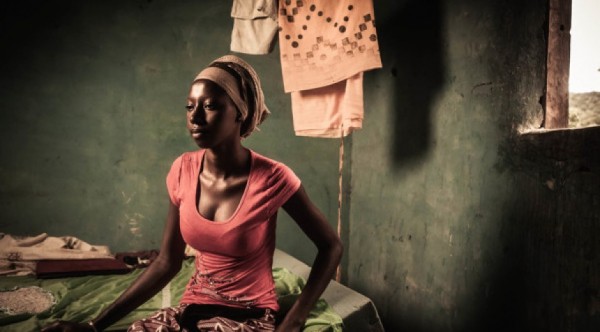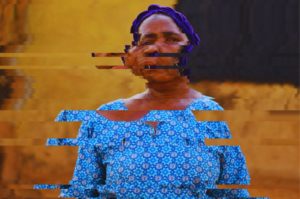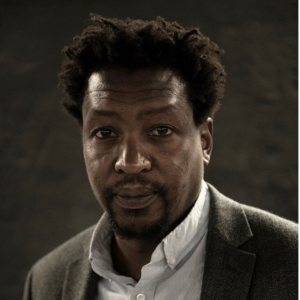The gripping drama of Amara’s life started last week right here on Brittle Paper when I posted the first of Omojola’s three-part story. [Read Pt. 1]
Amara is a teenage girl living in a ramshackle housing tenement in the sprawling city of Enugu. At the very end of part one, Amara is hopeful that he is the miracle she’s been waiting for all her life. She’s all dreamy and relieved and certainly can’t see that things are about to take a frightfully dark and twisted turn.
See what happens next.
The second time Amara had met him was one windy evening, two weeks after their first meeting.
She had been on her way home from the JAMB extra mural classes she attended every Monday, Wednesday and Friday afternoon. He had been standing beside his shiny Mercedes Benz on her street, making a phone call and laughing and trying to light a stick from the packet of cigarettes he must have bought from Musa, the Hausa cripple who ran a small kiosk near her house. Her heart had skipped a beat as she recognized him, and then made up for the loss by hammering at her chest as if it would burst. She was too close to him to turn around and flee without him noticing, so she had just walked on ahead, her head rigidly bowed so that he would not see her face.
“Amara,” she heard him call as she walked past.
“Good evening,” she responded, and against her best intentions, slowed down, and raised up her head. He looked different that evening, and more handsome. He was dressed in a white safari suit and matching white shoes. A white singlet peeped from above the first button of the safari suit. She could see curly strands of jet black hair above the singlet. A massive gold chain and pendant glittered on his chest. He had a small version of the same chain on his right wrist and his fingers hosted a startling collection of gold rings. On his left hand was a gold wristwatch. Everything about him gleamed and Amara had felt a little hollow in her stomach.
He walked up to her and she felt self conscious in her shabby clothing. She looked around. It would not be long before the news went round that she was seen with a man. And on her street, news never went round for long in its pure version. Every mouth recasting the story was bound to add its own seasoning to make the account a little sweeter in the ear. She was guilty of the same sin in the past. The cursory glances she was getting from passersby and all those people loitering about on the street pretending not to be looking was not lost on her.
“I know how uncomfortable you must feel, talking to me here like this, but take my number and call me,” he said, as if he had read her mind. He called out the numbers, twice as they walked. And she had nodded to tell him she had it.
He turned around and left after she had repeated it correctly to his hearing, and promised to write it in the exercise book she held so that she would not forget.
Amara could barely conceal her excitement as she skipped home.
“Take my phone, flash him now now let him call,” Ada said, thrusting her Nokia phone in Amara’s face.
“Isn’t it too early?” Amara hesitated, but collected the phone.
“It’s actually getting late, Amara,” Ada scowled. “He must have been expecting your call for ages now.”
“We only parted few minutes ago,” Amara insisted as she dialed his number. The name “JulioCeasar” appeared on the face of the phone.
“Ah, sister? Do you know this man?” Amara queried, surprised and suddenly afraid.
Ada had gone ashen, looked flustered for a second, and then quickly gathered her wits about her.
“This is a small town biko”, she scowled, snatching her phone from Amara’s hand. “The man looked for me and found me. That is how much he wants you,” she explained, a worldly look on her face.
Amara sat on the floor of their room and watched her elder sister folding away the clothes that they had washed earlier in the day, and something told her everything was not alright.
“It seems you want to be poor for the rest of your life, and continue to use rags as sanitary pad,” Ada spat into her sister’s thoughts.
The stench from the overflowing septic tank behind the building wafted into the room and Amara’s stomach rebelled. While her sister nagged, she placed her palms against the cold floors on which she sat, lifted her buttocks and passed a silent gulf of gas. She felt a little relieved then, and better able to listen to Ada’s homily.
“Amara, this is no time to start doing baby-baby or nice-nice o’. You are to sound like a big girl for him o’.
Amara was still thinking up what to say and what to not say when the phone rang shrilly in the still night atmosphere.
“Hello,” Ada said sweetly into the mouth piece, giving Amara a scalding look.
“No, this is not Amara, its Ada.” Amara’s heartbeat was uncontrollable.
There was silence for a second.
“No, nothing dey happen,” Ada had quipped and laughed for a while.
“Oh, okay, let me give the phone to her,” she said finally. And after surviving another glare that was capable of bleaching her delicate skin, Amara collected the phone from her sister’s outstretched hand.
She was stiff and awkward at first, but his voice which sounded like honey over the phone soon melted the icicles of fear and suspicion that stood guard around her heart. Fifteen minutes later, Amara was chatting and laughing freely away, basking in the klieg lights of Ada’s approving smile and ‘thumbs up’ signals.
“It all depends on where you want me to meet you…” she heard herself saying, her eyes seeking more approval from her twenty one year old sister.
She got it, and she felt grown up and emancipated, like a cauliflower that had been carefully harvested by an unseen hand, shaken gently but thoroughly until its roots were free from every modicum of inhibition.
***
Children always looked forward to the rains.
With it came the insects they called ‘Aku’.
When they were younger, Ada told her that the insects were stupid to go so close to the fluorescent tubes, because after the bulbs burned them, they always needed a cold bath which they never survived. Amara and the other children led by Ada always placed a bucket of water underneath the light, captured the hapless insects in their hundreds, shared them among themselves, fried them, and enjoyed their snacks in bed at night.
Amara watched as children still clad only in panties after enjoying a bath in the rain squatted beside a bucket of water while the biggest among them divided the spoil. She wished she could be like them again, concerned only by the number of Aku she would crunch that night.
“So, you are pregnant!” Ada repeated aloud before Amara’s soapy right palm flew to cover her elder sister’s mouth, as if to push the words back in. Amara’s big eyeballs roved frantically to see if anyone was about. Ada looked too. They should not have bothered. They were alone in the backyard where they sat doing the dishes. Their only companions were the children making happy noises and waging a renewed war against another influx of frantic insects.
“You should hide your face in aja-uro, Amara. Shame is too good for you!” Ada had hissed, stood up, wiped her wet hands on the seat of her flowered gown and retreated into the house. Amara just sat there, her head bent.
Julius had been wonderful.
He had shown her a world she never knew before now. His pocket was bottomless and his hands never stopped going there. The first thing he had done was to buy her new clothes – all the new styles girls favored today, designed to reveal more than cover.
“I can’t wear these things,” she had protested, admiring her own curves in his bedroom mirror as she sampled the clothes.
“Yes you can, you are wearing them now,” he had laughed from the bed, his hand inside his boxer shorts, cradling his member. She showed the clothes to Ada when she got home, and they agreed she would keep them in her bag as she left for school every morning, and change into them after school, to go see Julius. Every morning, she was ashamed of herself as she snuck the clothes sheathed in a dark nylon bag into her back pack. As if it helped assuage or hide her guilt, she always shoved it underneath her books. Several times she had almost confided her new relationship in Ndidi her best friend, but she had restrained herself with both hands. Ndidi would never approve, and then her secret would be just like the fowl’s anus – prone to revelation at the instance of little wind.
The idea had worked like magic. Even she almost never recognized herself after 2pm everyday. The curvy little vixen who emerged from the “Ladies” at Mr. Biggs on Okpara Avenue with a Darling-Yaki wig hiding her low-cut hair, and FashionFair eyeshadow on her pretty face was never the timid school girl who had walked in earlier, clutching a nylon bag. Not that anyone really paid her any attention in the place anyway. The waiters were always too busy with hungry customers. Only one young security man always stared at her, but he too never said anything, he dared not.
The next miracle Julius wrought was the purchase of her JAMB scratch card.
While her father had been wriggling and nagging and threatening hell and brimstone if she dared fail and waste his money, (money he was yet to piece together), Julius had bought her JAMB form with just a phone call to his friend whom he said worked at the bank where they sold the card. A cleaner from the bank had brought the card to them in Julius’ apartment, and Julius had counted the money, four thousand, five hundred naira – the five hundred naira was for the boy’s transportation – all in crisp one hundred naira notes. As he retreated, overjoyed and thanking an amused Julius effusively, the gangly boy had tripped over a drinking stool in the middle of the living room and Amara and Julius had burst into laughter at his exit.
Amara had hugged Julius when he handed the hitherto elusive card over to her.
“I just love to see you happy, obi’m,” he cooed as she plastered his face with kisses. In just a little while, it was amazing the transformation she had gone through. She was bolder, sexier, better groomed and more mature than all her peers, all thanks to Julius.
He had also given her money for the registration at a cybercafé, and promised to get her into a special centre where everyone was guaranteed scores that would guarantee admission into universities of their choices. As Amara dressed up again that evening in her blue and white school uniform, she suddenly could not wait to be through with secondary school, and get into the university where like Ada she would finally be free, free to live her life with Julius. She had glanced at Julius who laid asleep in bed, a look of contentment on his handsome face as he snored, and for the umpteenth time, Amara wondered what he was doing with her. He was a young man who had everything it took to date any of the more sophisticated Enugu girls, yet he had chosen her. Maybe it was because she was a virgin, and he had been the one who broke her? But then, he was not to know she was a virgin when he was pursuing her. She sighed, picked up the money he left on the dresser for her and had snuck quietly out of the apartment without waking him up.
“You see what I was telling you, eh?” Ada had bristled in her best ‘I-told-you-so’ voice when Amara had given her sister the news.
“You see now – and you were there behaving like baby – baby Kingsway. You have to use what you have to get what you want, nwanne’m.”
Their father had coughed in the living room, an exaggerated cough that was pregnant. And the girls had fallen silent and gone to bed.
Those days with Julius were the best she had spent in her entire seventeen years – until the month her period had ceased.
She had waited for a pensive two weeks and when she could not bear it any longer, had stolen to a roadside laboratory to run a pregnancy test. She had heard many girls in school talk about the place at New Haven. The laboratory attendant had been nasty. A girl her age or a little older, she had worn an irritated look on her pox-marked face as she asked for the patient’s name. There was no way Amara was going to use her real name, and the receptionist had snickered when she said her name was ‘Esther Aja.”
The laboratory scientist was a fair, fat, short man with a face as round as a ball. Amara decided he was either angry or in a hurry the way he had tied her slender bicep too tight with a green rubber tourniquet, slapped her forearm in something akin to rage and stuck a needle in the first vein that responded. Amara watched as the syringe filled with her blood. The man had withdrawn the needle at a surprisingly more sedate speed, given her a wet cotton wool to press to her forearm, and eased the extracted blood from the syringe into a vial. He had disappeared behind a dirty blue curtain for what seemed like a lifetime before emerging again armed with a white envelope and a dirty smile.
The long hiss of the receptionist followed Amara down the stairs and into the street filled with blaring horns and speeding car headlights.
[See how the story ends next Wednesday.]
Image by Anthony Kurtz, from his street photography project on Senegal. See more photos HERE.
***
 Oluwafunminiyi Omojola is a Nigerian writer who is also a banker. Being a Yoruba man who is married to a Hausa lady and resident in Iboland, Funminiyi considers himself an epitome of the detribalised Nigerian.
Oluwafunminiyi Omojola is a Nigerian writer who is also a banker. Being a Yoruba man who is married to a Hausa lady and resident in Iboland, Funminiyi considers himself an epitome of the detribalised Nigerian.
His poems and short stories have appeared in many news dailies and magazines around Africa including The Sunday Sun, This Day, and The Kalahari Review.










Emma ugwa November 28, 2013 17:18
e h gini we mezia? Wednesday is too far